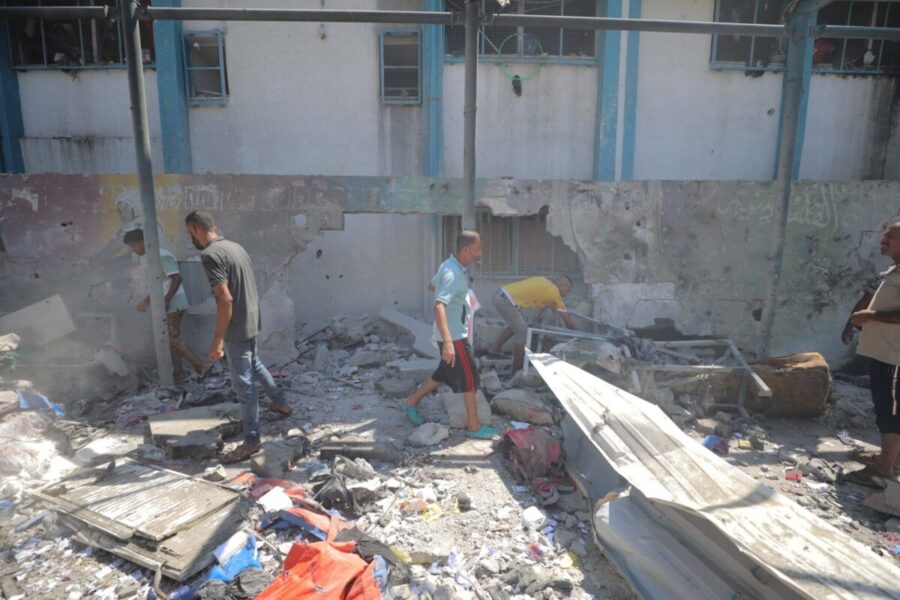
Gaza war forces countries around the world to freeze their arms deals with Israel
The world is getting alarmed over the continued war on Gaza and the ongoing crimes committed by the Occupation, despite all international appeals. This has led the United States to delay a shipment of weapons for Israel, causing tension between the two. The delay is affecting hundreds of shipments of artillery and ammunition, and not only 3,500 heavy bombs for the Israeli Air Force.
Israel’s concerns are aggravated by the American and international link between the delay in supplying weapons and the numerous reports of innocent casualties falling in Gaza. In comparison, during the first weeks of the Gaza war, the Americans put all their efforts to supply the Occupation with weapons as quickly as possible, and the Pentagon worked around the clock to speed up their transportation, even on weekends. There were arms that were on their way to Ukraine but were turned around and shipped to Israel for use in the Gaza war, instead.
Delaying the US arms shipment to Israel means that Washington’s agenda will have an impact on the war in Gaza. It is no longer a secret that the war’s continuation has become a source of great inconvenience for the US and that Prime Minister Netanyahu’s scheduled speech before Congress will seem disconnected from reality. However, American priorities seem focused on two fronts: the first is using pressure on mediators to conclude a prisoner exchange deal with Hamas and a ceasefire. The second is putting pressure on Israel not to engage in an all-out war in Lebanon. Both issues are linked to the supply of ammunition to the Occupation.
Freezing arms deals with Israel is not limited to the United States. While Israel is trying to mend the situation and decrease tension following the freeze of supply of weapons with the US, other countries followed suit. These developments are causing Israeli security to be concerned about a shortage in ammunition.
The increasing disputes between Tel Aviv and Washington due to the delay in arms shipments are a source of concern for the Occupation army these days. Israel is worried that another reality is being shaped, namely the possibility of a shortage in ammunition. A number of countries have unofficially stopped dealing with Israel and arms suppliers in several European countries have stopped responding to their Israeli counterparts. A certain foreign power that previously traded with the Occupation has refused, since October 7, to provide it with raw materials it needs to use in the war on Gaza.
France kicked an Israeli military industries delegation out of an important weapons exhibition, and Canada effectively severed its security relations with the Occupation. It is currently preventing the delivery of protective gear for use by special border guard units, which fight daily in Gaza Strip and the West Bank. Belgium also announced the cessation of military exports to the Occupation and Spain prevented a ship carrying 27 tons of explosives from India to Israel from docking on its shores through the port of Cartagena.
Israel is always seeking to diversify its arms sources. India, for example, is the number one importer of Israeli weapons, while raw materials used by the Israeli weapons industry come from a different country. In the meantime, Serbia has provided the Occupation with millions of dollars’ worth of arms since the outbreak of the Gaza war.
This shows that the Israeli aggression on Gaza, and the international isolation it caused for the Occupation, led to an unusual shortage of all kinds of ammunition for the army. There are also other international factors, such as the Ukraine war. This led to an increase in prices and competition between various countries for ammunition and raw materials, prompting the Occupation army to control the pace of bombing due to the global shortage of ammunition and the extensive use of it at the beginning of the war.
According to unofficial Israeli estimates, the Occupation may face a shortage of tank shells, to the point that some of the tanks stationed in Gaza are now on partial alert, carrying a lesser number of shells, in order to save them in the event of war breaking out on the northern front. This prompted senior army generals to claim that there is already a scale down in arms due to the shortages of spare parts for tanks, D9 bulldozers, armoured vehicles and other light ground munitions.
SOURCE: https://www.middleeastmonitor.com/20240720-gaza-war-forces-countries-around-the-world-to-freeze-their-arms-deals-with-israel/

